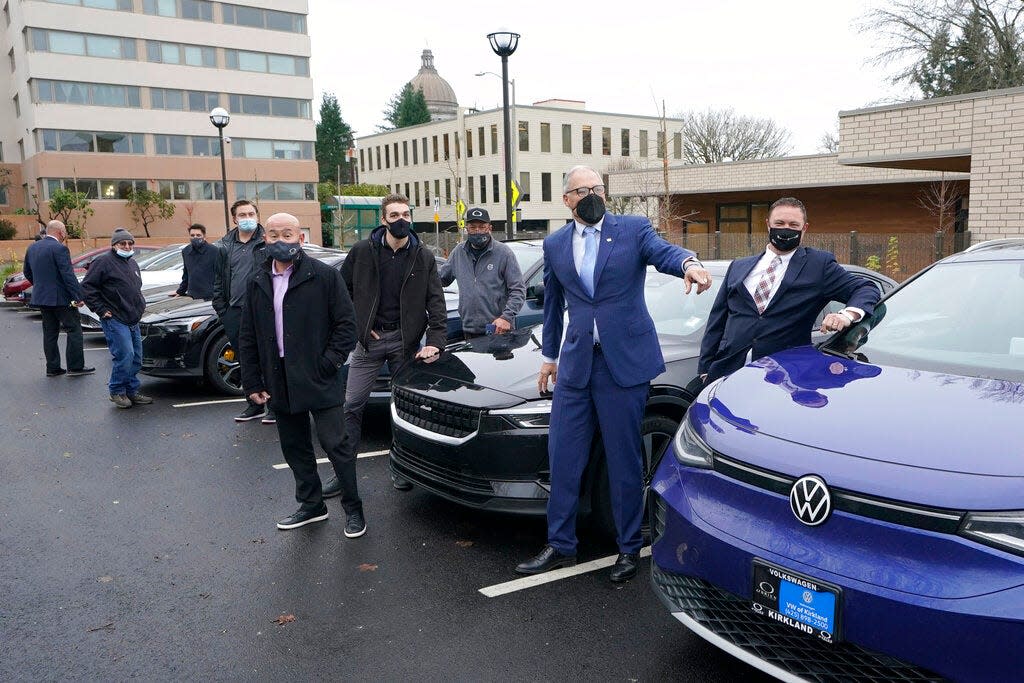Supply, vehicle cost make new $7,500 EV tax credit out of reach of most in Kitsap

The Inflation Reduction Act, which passed the U.S. House on Friday and awaits President Joe Biden's signature, extends a $7,500 consumer income tax credit for the purchase of new electric vehicles (EV) and implements a $4,000 credit for used electric vehicles. But for many Kitsap County residents looking to buy an EV, the tax credit won't apply — at least, not immediately.
The credit for new vehicles is limited to cars priced no higher than $55,000, though trucks, vans and SUVs can bypass this requirement and are eligible for the credit with a price of up to $80,000.
For used vehicles, the tax credit only applies to vehicles with a sale price of $25,000 or less and must have a model year of at least two years prior.
Yet according to Recurrent, the average price of a used electric car in Washington state in April 2022 was $49,105, much higher than the credit limit. Only 35 of the 279 electric vehicles for sale in Washington state during Recurrent's April count sold for less than $25,000 — about 12.5%.
And, the credit also does not apply to any household with a modified adjusted gross income (AGI) of above $300,000 or to single-income taxpayers with a modified AGI of above $150,000. For used vehicles, those limits are even lower, at $150,000 for married filers and $75,000 for single filers.
Finally, the tax full credit only applies to EVs with a battery built in North America with at least 40% of the minerals mined or recycled on the continent. By 2027, that requirement would reach 80%.
The minerals used in EV batteries — mostly lithium and cobalt — are mostly mined in China, Russia and other countries outside North America, according to the Associated Press.
However, if only that requirement isn't met, buyers may still be eligible for half the credit at $3,750.
The tax credits will apply through 2032.
Demand of EVs outstrips supply
In March 2020, Washington state adopted California's Zero Emission Vehicle (ZEV) program, a set of regulations designed to reduce emissions from gasoline-powered cars. Washington state's adoption of the standards goes into effect in 2024.
Jay Donnaway, president of the Seattle Electric Vehicle Association, said that before Washington state adopted the standards, some EV manufacturers refused to sell EVs in Washington.
"In previous years, automakers would send the cars to California and Oregon because they got emissions credits, but they did not for Washington," he said. The state's adoption of ZEV may lead to more EV availability in the coming years, he added.
Even with the difficulty of acquiring EVs, Washington state still has the fourth-highest number of EV registrations in the United States. In Kitsap County, 3,692 EVs were registered by residents as of Aug. 11, and the number continues to rise.
But because of the limited supply, buyers often wait months to receive EVs after purchase, Donnaway said, while adding that some buyers have waited similar lengths of time for gas-powered cars as well because of supply-chain issues.
At the Haselwood Volkswagon dealership in Bremerton, shipments of electric vehicles are delayed into 2023. A buyer who buys an electric Volkswagon car today would receive the car several months from now, at the earliest, depending on the model, a spokesperson said.
While new buyers are struggling to acquire cars, long-time owners are struggling to find mechanics trained in EV repair, Donnaway said, and some owners have resorted to shipping their cars to Oregon or California to receive maintenance.
Donnaway said the Inflation Reduction Act will relieve some of the supply issues in the long run, but that the effects won't be immediate. While the United States does have lithium deposits for manufacturers to mine, most are still located elsewhere, and changes to the process would take years.
"It's nice to have your product being the one that's most in-demand," Donnaway said, "but since we haven't had as strong a regulatory environment or the incentive structures compared to Europe, particularly countries like Norway, the U.S. as a whole just hasn't been allocated the hot, new cars like other countries have."
This article originally appeared on Kitsap Sun: Supply, vehicle cost make EV tax credit out of reach of most in Kitsap

